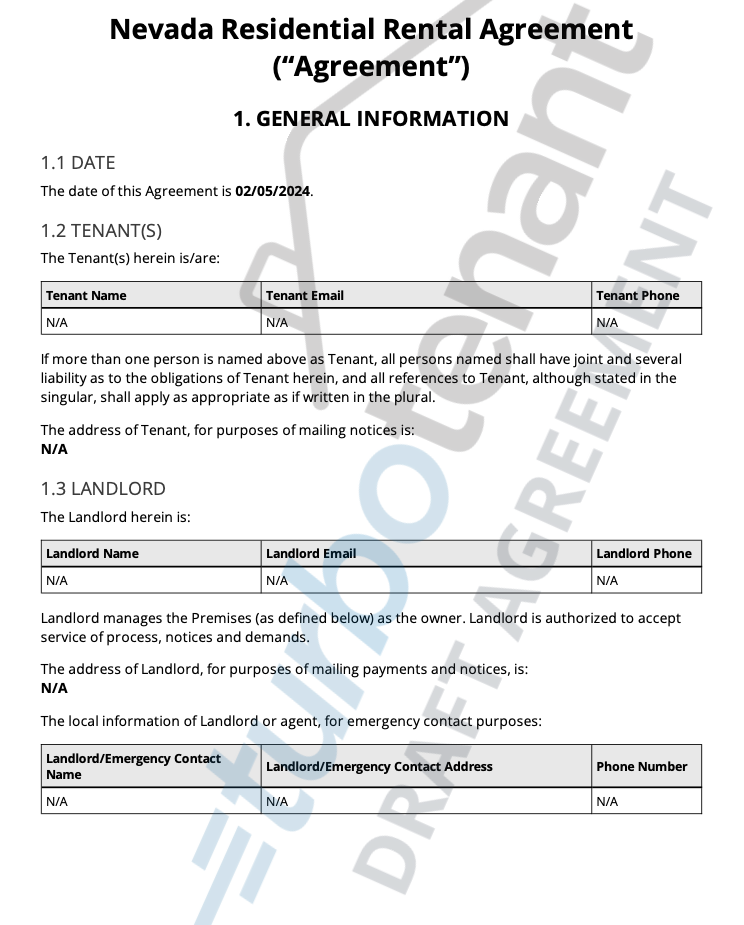
Navigating the intricacies of Nevada lease agreements requires a comprehensive understanding of both state-specific regulations and general lease agreement best practices. TurboTenant’s Nevada Lease Agreement Generator and Templates offer a seamless solution for landlords, ensuring that every lease agreement is not only compliant with Nevada laws but also tailored to the specific needs of the rental property, landlord, and tenants.
Section 1 – Custom to You
The initial section of a Nevada lease agreement is designed to capture the unique details of your rental situation. This customization ensures that the agreement accurately reflects the specifics of your property, the lease terms, and the responsibilities agreed upon by both landlord and tenant.
Key Customizable Elements
- Additional Provisions: This segment allows landlords to insert property-specific rules, necessary local clauses, or any other specifics they wish to include. It’s crucial to review these additions with a legal expert to ensure compliance and protect both parties’ interests.
- Lost Key Policy: Should tenants fail to return all keys upon moving out, they are liable for the full cost of rekeying the property. This clause ensures security and peace of mind for landlords.
Section 2 – Specific to Nevada
Nevada-specific regulations are embedded in this section to help landlords stay compliant with local laws. These include clauses on late fees, security deposits, and other state-mandated requirements. Any changes to this section can be made by our Advanced Editor, however please be aware changes to this section can place you out of compliance with state law so consulting with an attorney is always recommended.
Notable Nevada Regulations
- Late Fees (Section 2.1): Rent must be paid in full by the due date. A late fee of five percent (5%) of the unpaid rent amount is charged if rent is not received by the fifth day of each month.
- Security Deposit Provisions (Section 2.4): In Nevada, security deposits cannot exceed three months’ rent. Landlords must return the security deposit within thirty (30) days at the lease’s termination or expiration, providing a written accounting of any lawful charges or deductions.
- Fair Housing (Section 2.10): Discrimination in housing is prohibited based on race, color, religion, national origin, sex, marital status, disability, sexual orientation, gender identity, or familial status, in accordance with both United States and Nevada civil rights laws.
- Nuisance Notice/Right to Display US Flag (Section 2.15): Tenants have the right to display the American flag, though landlords can reasonably restrict the placement and manner of display.
Section 3 – General Clauses for Best Practices
This section includes clauses common to lease agreements across the United States, emphasizing best practices for fostering a healthy landlord-tenant relationship.
Key General Clauses
- Subletting (Section 3.1): Tenants are prohibited from subleasing the property without written permission from the landlord.
- Altering or Improving the Property (Section 3.2): Tenants cannot make alterations or improvements to the property without written consent from the landlord.
- Military Personnel Clause/Family Violence/Sex Offenses or Stalking (Section 3.8): The federal Servicemembers Civil Relief Act allows for lease termination under certain circumstances related to military service. Additionally, tenants affected by family violence, sexual offenses, harassment, or stalking may have the right to terminate the lease early with proper notice.
- Choice of Law (Section 3.11): The lease agreement is governed by Nevada laws and requires consent to the jurisdiction of county courts where the property is located.

FAQ
How much can I charge for a late fee in Nevada?
In Nevada, landlords can charge a late fee of five percent (5%) of the unpaid rent amount if rent is not received by the fifth day of each month.
What are the rules for security deposits in Nevada?
Security deposits in Nevada may not exceed three months’ rent. Landlords must return these deposits within thirty (30) days at the lease’s termination or expiration, along with a written statement of any deductions.
Do I need to inform my tenants about the right to display the US flag?
Yes, tenants in Nevada have the right to display the American flag on the rental property, but landlords can set reasonable restrictions on the placement and manner of display.
How does the lease agreement address fair housing laws?
The lease agreement complies with both federal and Nevada fair housing laws, prohibiting housing discrimination based on protected characteristics. Landlords and tenants must act in accordance with these laws.
TurboTenant Nevada Lease Agreements
TurboTenant facilitates the creation of comprehensive, legally compliant lease agreements tailored to the unique requirements of Nevada landlords and tenants. By utilizing TurboTenant’s Nevada Lease Agreement Generator and Templates, landlords can ensure their lease agreements are up-to-date with state-specific regulations and best practices, fostering a secure and transparent rental experience. For any specialized clauses or unique rental situations, consulting with a legal professional is advisable to ensure full compliance and protection.
Nevada Resources

